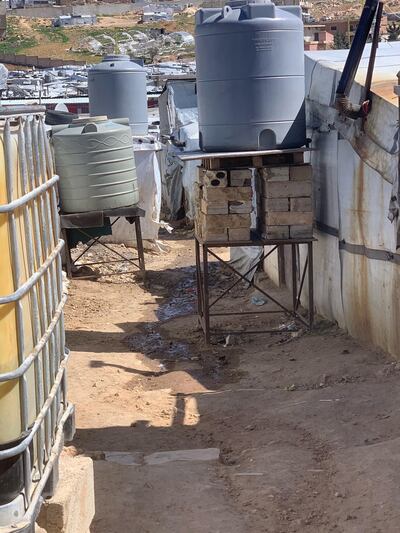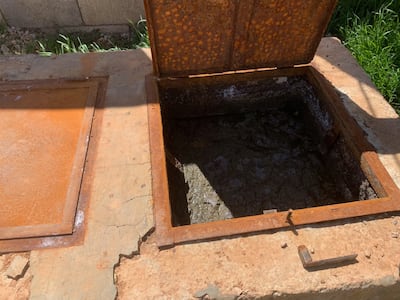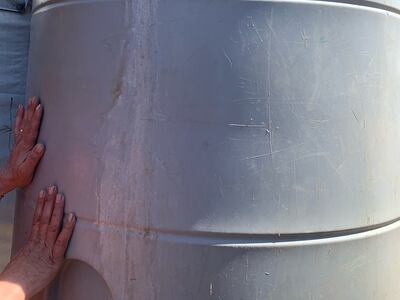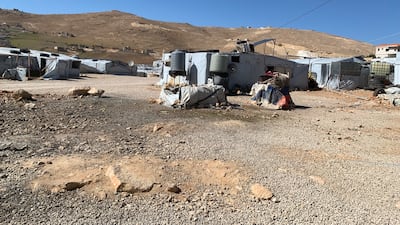About a month ago, Ahmad Al Zayed was trying to lift the lid covering the sewage system next to his tent in a Syrian refugee camp in the town of Arsal, where he has been since 2011. As he sought to open the system, the lid collapsed on his hands, taking off the top half of one of his fingers.
“I’m elderly, but I’m not afraid. It’s OK, I’m resilient.” he told The National.
As is common in the camps, the dilapidated sewage system was blocked and flooding — sending dirty and potentially contaminated water into an area where families, children and the elderly live side by side.
It is believed that about 77,000 refugees are in Arsal, a rocky, isolated town that sits in the Anti-Lebanon Mountain range and is only a few kilometres from Syria.
Its residents, who fled the brutal civil war in Syria, live in destitute conditions which they say are getting worse — with limited resources — and they have endured a succession of problems. Towards the end of 2022 it was a cholera outbreak, then the brutal winter high up in the mountains — now they face a surge in skin infections.
The rise has been linked to a lack of clean water and dreadful sanitation conditions in the camps, which were also blamed for the cholera outbreak. Large families living in cramped spaces make it easy for infections to spread.
Lebanon’s water and sanitation infrastructure is already ailing, particularly in the poorest areas such as those bordering Syria. And Lebanon’s crippling economic crisis has only exacerbated these problems.
Refugees say the support they receive from the UN is being steadily whittled away. They also complain that they are now receiving cash aid in the largely volatile local currency, rather than in US dollars as before.
Residents of the camps say they can barely survive with the meagre resources they have, and that they are unable to afford sufficient clean water.
A reduction in water dislodging, where dirty water is removed, is further exacerbating the problem, they say.

In Arsal’s camps, the remnants of the last flood can still be seen on the ground. Dirty patches of water have appeared near the water tanks that families use, as children play nearby with plastic bags.
In Ahmad’s settlement, camp leader Lutfi pulls the lid off one of the main sewage containers to show how close it is to overflowing. Recently the camp has flooded every three days.
“Now it’s almost reached the top and it might flood anytime soon,” says the father of four.
“It was flooding in the tents,” adds Lutfi, referring to the most recent incident in the camp of about 50 families.
“The smell is intolerable to sleep or eat or stay around. It’s creating a lot of tension with the Lebanese households because they can also smell it when it’s flooding.”
In Arsal, often Lebanese homes border the refugee camps. Refugees make up about two-thirds of the Sunni Muslim-majority town.

The tank that provides water to the tent where three families live — including Ahmad’s — has not been changed in 11 years, says Shamsa Mohamed Al Zayed, who also resides in the camp and has suffered with a skin infection. “I’ve not fully recovered, I’m still itching at night.”
She points to a hole in the container that they have had to close up themselves.
At another informal settlement on Arsal camp, leader Mahmoud Youssef has a wound on his head which he got while trying to a fix a tent that had collapsed during windy weather.
“There are elderly, there are people with disabilities, there are women, there are children in all of this,” he says, gesturing around the camp.
Mr Youssef says he gets 2.5 million Lebanese lira a month from the UN — about $25 on the parallel market. But now refugees in the camp need to pay for the water dislodging, which needs to be done as often as every five days and costs 450,000 Lebanese lira alone.
“We’re dying at the moment, and not living.”
According to Doctors Without Borders (MSF), the charity has treated 138 households for skin infections in Arsal and Hermel — another town in north-east Lebanon in the last month or so.
Acute diarrhoea is also rising, said Dr Marcelo Fernandez, the Head of Mission in Lebanon. “Both health conditions are normally linked to exposure to poor water quality and dire sanitation conditions,” he added.
Dr Fernandez said the combination of the “economic and political crisis, and insufficient aid” meant that many people in the affected areas were living “without access to clean water and adequate sanitation facilities. This is putting them at a heightened risk of waterborne diseases and skin infections.”
“MSF is providing medical treatment, and distributing hygiene kits to the affected communities to address the health needs posed by the situation. However, longer-term sustainable solutions are needed to ensure that communities are not at constant exposure to preventable diseases and infections,” he said.

In another camp in Arsal, Abu Ali Rifrai flicks through photos on his phone. He shows some of the flooding in the camps and the skin infections on a young child, his grandson — dry, crusted wounds on the chin.
“In Arsal specifically, it’s quite challenging that this is happening. The type of the land — it’s not soil. It’s rock and it doesn’t absorb the water and sewage. We’re concerned and of course we are having skin infections as a result,” said Mr Rifrai, the camp leader.
There have been more than 30 cases of skin infections in his camp in the last week alone and about 20 cases of diarrhoea.
On a visit to his camp, Mr Rifrai showed homes where the trails of slugs attracted by the sewage could be seen on the walls next to where the groceries were stored.
Like everyone else, he says the causes are the same. Aid cuts mean families have to take difficult financial decisions and cannot afford enough clean water, while there has been a reduction in water dislodging.
“What is happening to us at the moment is that we are being stranded, on top of being homeless for the past 12 years. None of the basic human rights are being provided to us,” said Mr Rifrai.


